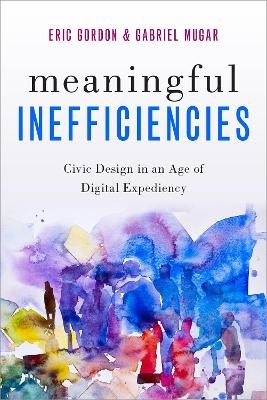
Meaningful Inefficiencies
Oxford University Press Inc (Verlag)
978-0-19-087014-0 (ISBN)
Meaningful Inefficiencies is about the practices undertaken by civic designers that challenge the normative applications of "smart technologies" in order to build or repair trust with publics. Based on over sixty interviews with change makers in public serving organizations throughout the United States, as well as detailed case studies, this book provides a practical and deeply philosophical picture of civic life in transition. The designers in this book are not professional designers, but practitioners embedded within organizations who have adopted an approach to public engagement Eric Gordon and Gabriel Mugar call "meaningful inefficiencies," or the deliberate design of less efficient over more efficient means of achieving some ends. This book illustrates how civic designers are creating meaningful inefficiencies within public serving organizations. It also encourages a rethinking of how innovation within these organizations is understood, applied, and sought after. Different than market innovation, civic innovation is not just about invention and novelty; it is concerned with building communities around novelty, and cultivating deep and persistent trust.
At its core, Meaningful Inefficiencies underlines that good civic innovation will never just involve one single public good, but must instead negotiate a plurality of publics. In doing so, it creates the conditions for those publics to play, resulting in people truly caring for the world. Meaningful Inefficiencies thus presents an emergent and vitally needed approach to creating civic life at a moment when smart and efficient are the dominant forces in social and organizational change.
Eric Gordon is a professor of civic media and the director of the Engagement Lab at Emerson College in Boston, Massachusetts. His research focuses on civic engagement and the transformation of public life and governance in digital culture. He has served as an expert advisor for local and national governments, as well as NGOs around the world, designing responsive processes that encourage play, delight, and deliberation. He is the author of two books about media and cities and, most recently, is the editor of Civic Media: Technology, Design, Practice (MIT Press, 2016) and Ludics: Play from Antiquity to Present (Palgrave, 2020). Gabriel Mugar (Ph.D., Information Science and Technology, Syracuse University) is a design researcher at the global design consultancy, IDEO. He specializes in working with communities and organizations to design opportunities for learning, collaboration, and storytelling.
Acknowledgements
Introduction
Chapter 1: Innovation
Chapter 2: Publics
Chapter 3: Play
Chapter 4: Care
Chapter 5: Practice
References
Index
| Erscheinungsdatum | 21.02.2020 |
|---|---|
| Verlagsort | New York |
| Sprache | englisch |
| Maße | 146 x 224 mm |
| Gewicht | 332 g |
| Themenwelt | Sozialwissenschaften ► Kommunikation / Medien ► Allgemeines / Lexika |
| Sozialwissenschaften ► Kommunikation / Medien ► Journalistik | |
| Sozialwissenschaften ► Kommunikation / Medien ► Kommunikationswissenschaft | |
| Technik | |
| Wirtschaft | |
| ISBN-10 | 0-19-087014-1 / 0190870141 |
| ISBN-13 | 978-0-19-087014-0 / 9780190870140 |
| Zustand | Neuware |
| Informationen gemäß Produktsicherheitsverordnung (GPSR) | |
| Haben Sie eine Frage zum Produkt? |
aus dem Bereich


